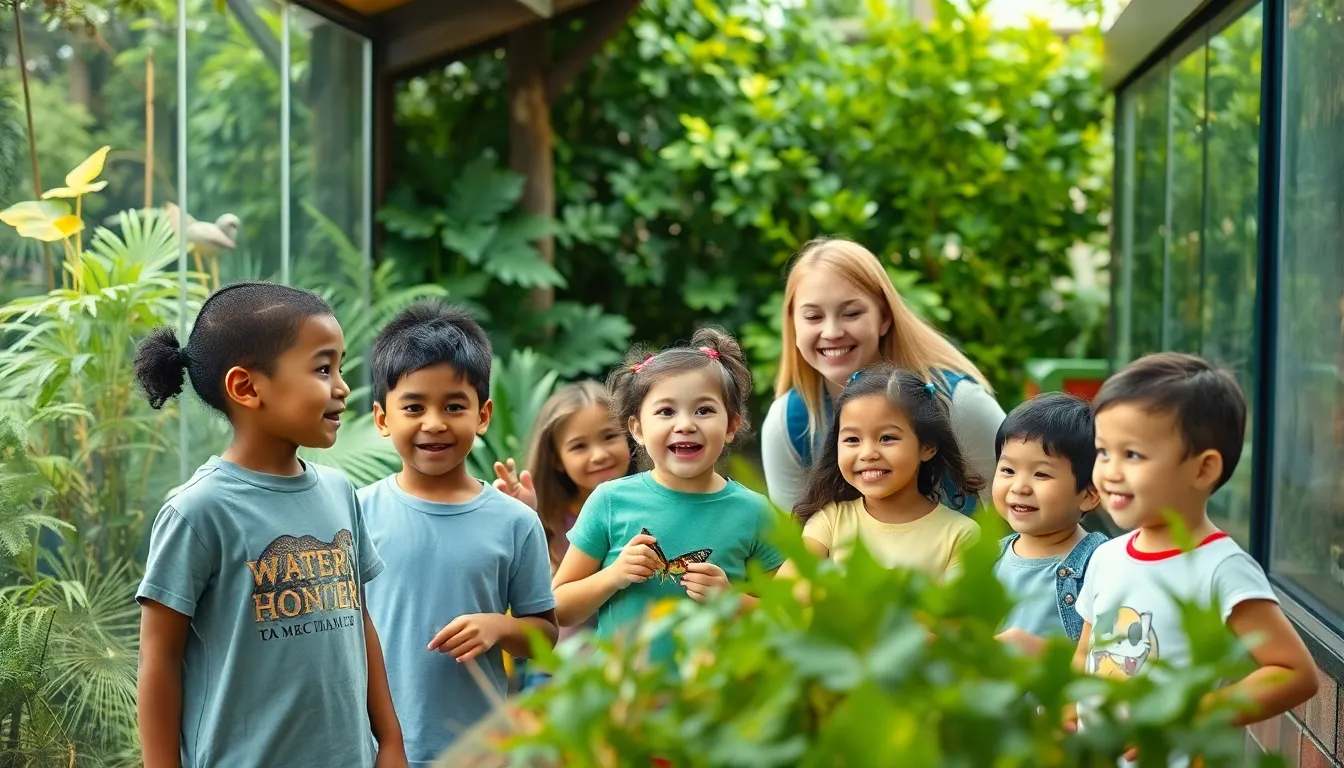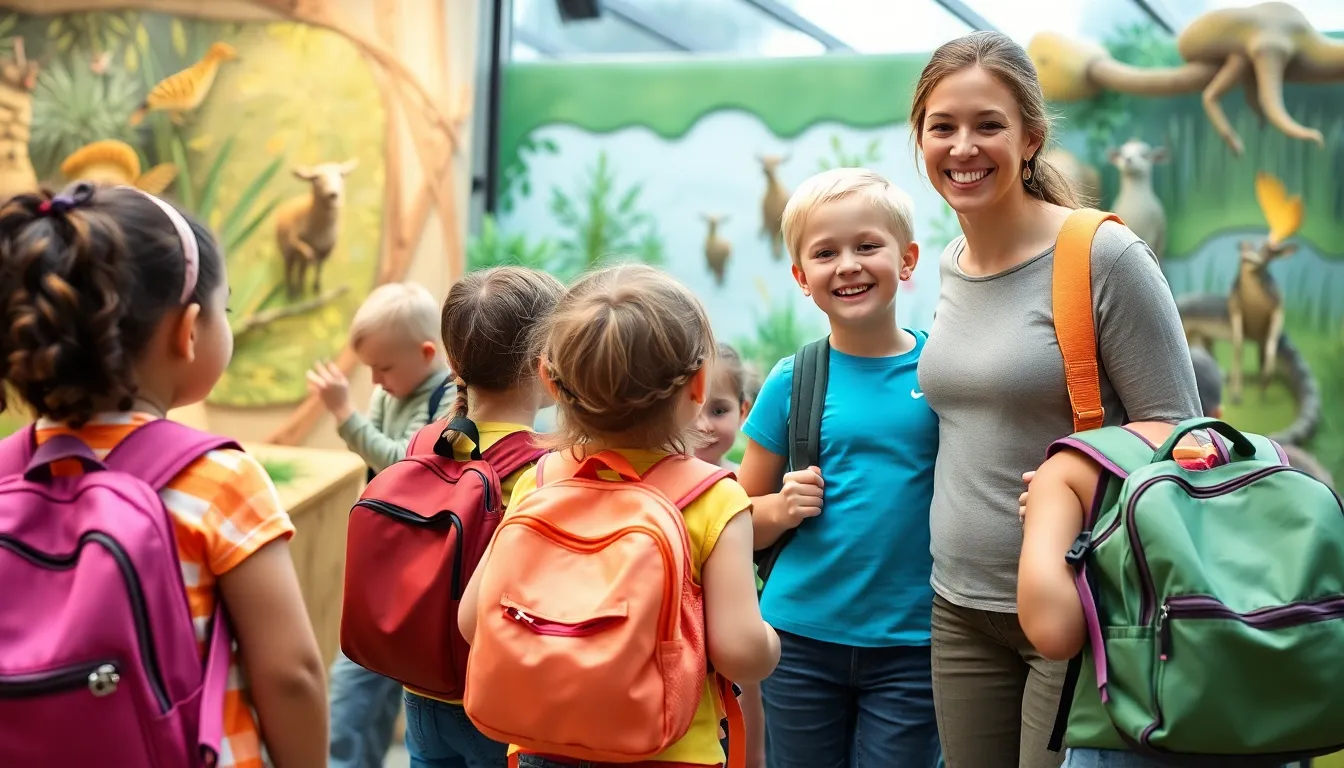Table of Contents
ToggleField trips play a crucial role in preschool education, offering children unique opportunities to explore and learn outside the classroom. These excursions spark curiosity and enrich their understanding of the world, transforming abstract concepts into tangible experiences. Whether visiting a local farm, museum, or nature center, preschool field trips create lasting memories and foster a love for learning.
Not only do these outings enhance social skills and teamwork, but they also allow children to engage with their environment in a hands-on way. As educators and parents seek to provide well-rounded experiences for young learners, understanding the benefits and planning effective field trips becomes essential. Discover how these adventures can ignite a passion for discovery and shape the future of preschoolers.
Benefits of Preschool Field Trips
Preschool field trips offer significant advantages that contribute to children’s overall development. These outings provide enriching experiences that facilitate learning beyond traditional classroom settings.
Social Development
Field trips enhance social development by encouraging interaction among peers. Children learn to communicate effectively through shared experiences. They develop essential teamwork skills by collaborating on activities during trips. Exposure to diverse settings and new individuals fosters adaptability and respect for others. Experiences like visiting museums or parks promote friendships, as children engage in group discussions and activities.
Cognitive Growth
Cognitive growth occurs through hands-on learning experiences presented in field trips. Children encounter real-world applications of classroom concepts, making learning relevant and engaging. For example, observing animals during a zoo visit reinforces lessons about biology. Such experiences stimulate curiosity and critical thinking as children ask questions and seek answers. Field trips also enhance memory recall, as interactive engagement aids in retaining information.
Planning a Successful Field Trip


Planning ensures that preschool field trips maximize educational value and enjoyment. Two key areas to focus on include selecting appropriate destinations and preparing everyone involved.
Choosing the Right Destination
Choosing the appropriate destination is essential for a successful field trip. Consider locations that complement the curriculum and spark interest.
- Museums: Offer hands-on exhibits that engage young minds.
- Nature Centers: Provide opportunities for exploration and environmental education.
- Farmers’ Markets: Present real-world contexts for learning about agriculture and healthy eating.
Evaluate safety, accessibility, and age-appropriateness when selecting a site. Confirm availability and any group discounts or educational programs that enhance learning experiences.
Preparing Students and Parents
Preparing students and parents maximizes participation and mitigates potential challenges.
- Provide Information: Distribute clear details about the trip itinerary, objectives, and essential items to bring.
- Discuss Behavior Expectations: Set guidelines for conduct to ensure safety and enjoyment.
- Arrange Transportation: Ensure secure and reliable transport options for the group.
Encourage parents to participate by either volunteering as chaperones or discussing the trip with their children. This engagement fosters enthusiasm and reinforces learning objectives before the trip occurs.
Safety Considerations
Safety is paramount during preschool field trips. Proper planning enhances security and ensures a positive experience for all participants.
Supervision Ratios
Establishing appropriate supervision ratios is essential for maintaining safety on field trips. A common guideline recommends one adult for every three to five children, depending on the activity and location. Adjusting ratios based on the age and needs of the children contributes to effective oversight. For example, outings to busy environments may require more adult supervision to manage potential hazards.
Emergency Procedures
Developing clear emergency procedures prepares educators and chaperones for unexpected incidents. Staff should review and rehearse these plans before the trip. Emergency procedures must include designated meeting points, communication methods, and first-aid protocols. Ensuring all adults understand their roles in case of an emergency promotes a swift and organized response, safeguarding the well-being of all children involved.
Engaging Activities During Field Trips
Field trips offer dynamic experiences that enhance learning through engaging activities. These excursions provide opportunities for young learners to explore, interact, and apply their knowledge in real-world settings.
Interactive Learning Opportunities
Interactive learning opportunities during field trips foster engagement and curiosity among preschoolers. Hands-on activities encourage exploration of environments, such as:
- Nature Walks: Children observe plants and animals, prompting discussions about ecosystems and biodiversity.
- Art Stations: Locations like museums offer art creation, allowing children to express creativity while learning about famous artists or techniques.
- Science Experiments: Facilities such as science centers provide interactive exhibits where kids conduct simple experiments, reinforcing scientific concepts through practice.
These experiences enrich understanding while enhancing retention of information by connecting new knowledge to tangible activities.
Incorporating Curriculum Standards
Incorporating curriculum standards during field trips aligns experiences with educational goals. Educators can create targeted activities that address state guidelines, including:
- Storytelling Sessions: Visits to libraries can relate literacy activities to language development goals, allowing children to listen to stories and discuss moral lessons.
- Math Challenges: Farmers’ markets can present activities focused on counting or measuring fruits and vegetables, reinforcing math skills through practical application.
- Social Studies Projects: Historical sites can inspire projects about community roles and historical figures, enhancing understanding of cultural heritage and social interaction.
Aligning these activities with curriculum standards ensures that field trips contribute to holistic development in line with educational objectives.
Preschool field trips are more than just a fun day out. They provide essential learning experiences that foster curiosity and social skills in young children. By exploring new environments and engaging in hands-on activities, kids develop a deeper understanding of the world around them.
Effective planning and safety measures ensure these outings are enjoyable and educational. When educators and parents collaborate to create meaningful field trips, they inspire a lifelong love for learning. Investing time and effort into these experiences can yield significant benefits for children’s growth and development.




